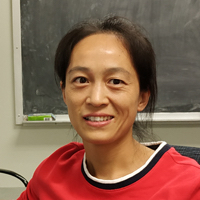
- This event has passed.
Shasha Gao (UF Mathematics)
September 16, 2021 @ 10:40 am - 11:30 am

A two-sex model of human papillomavirus infection: Vaccination strategies and a case study
Vaccination is effective in preventing human papillomavirus (HPV) infection. It remains debatable whether males should be included in a vaccination program and unclear how to allocate the vaccine in genders to achieve the maximum benefits. In this talk, we use a two-sex model to assess HPV vaccination strategies and use the data from Guangxi Province in China as a case study. Both mathematical analysis and numerical simulations show that the basic reproduction number, an important indicator of the transmission potential of the infection, achieves its minimum when the priority of vaccination is given to the gender with a smaller recruit rate. Given a fixed amount of vaccine, splitting the vaccine evenly usually leads to a larger basic reproduction numberand a higher prevalence of infection. Vaccination becomes less effective in reducing the infection once the vaccine amount exceeds the smaller recruit rate of the two genders. In contrast with allocating the same vaccine amount every year, we find that a variable vaccination strategy with more vaccine given in the beginning followed by less vaccine in later years can save time and total vaccine amount.